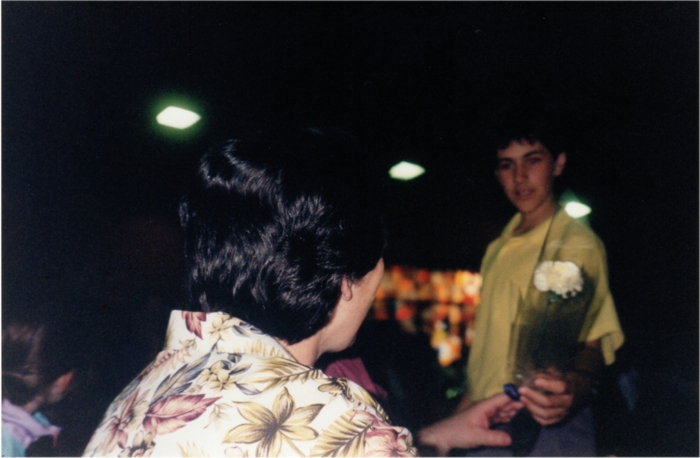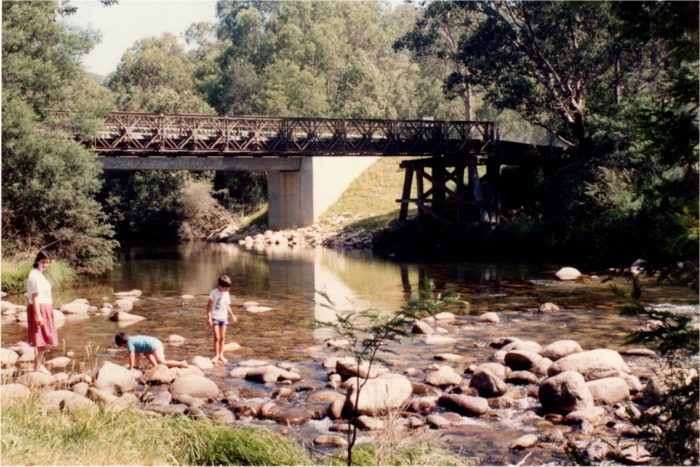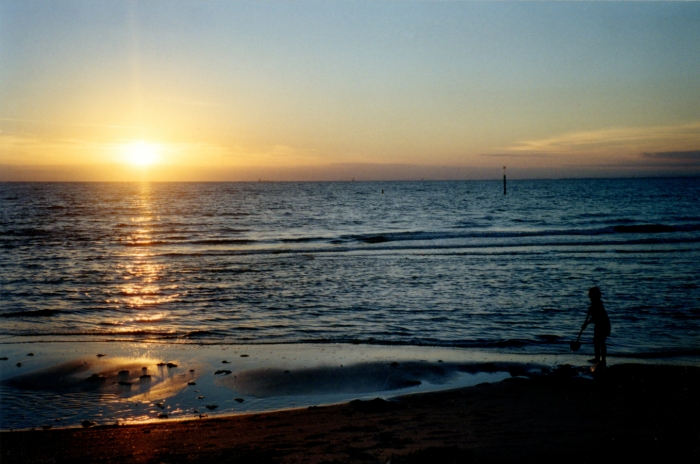Today is Mother’s Day in Australia.
So what better way to recognise the lives and contributions of mothers everywhere than by sharing the heart warming story of my own. She sought a formal autism assessment not long after I discovered I was on the Spectrum. But this was just one step along the journey from a disconnected childhood world “with a solitary occupant” to one that is “open and welcoming and actively seeks connection to others”.
So thanks Mum! I love seeing you grow in confidence to be seen. Despite the fact that I’ve been living a very independent life for over a decade, you’re still an invaluable ongoing support to me.
Thanks again for everything! 🙂
Peace,
Paul.

Mum’s Non-Diagnosis Story:
Early in 2015, a few months after his 30th birthday, I received an email from my eldest son about coming over for Sunday lunch. He added, “PS: I definitely have aspergers :)”
This realization was predominantly an experience of resolution. As understanding his diagnosis unfolded for me, I could see the many seemingly unrelated pieces of his life falling into place and actually fitting together. Aspergers gave a name and a framework that allowed all the pieces to form a coherent whole that made sense. This experience, and my ongoing reading, raised questions for me about how all my seemingly unrelated pieces fitted together – my selective mutism as a child, my withdrawal from and/or failure in mainstream education, my ongoing inhibition, social anxiety and depression, my overarching experience of there being something wrong with me. My son’s diagnosis renewed my quest for self-understanding which had begun many years earlier.
Sometime in 1993 I came across a book called “Nobody Nowhere” by Donna Williams. It is described on the cover as “The remarkable autobiography of an autistic girl.” At this stage I was 35 years old, I was attempting to rebuild my life after significant losses four years earlier, had two sons aged 9 and 7, and the undiagnosed depression evident since adolescence had at last been identified and begun to be effectively treated. Both the boys were having some difficulties at school and the word “gifted” had entered our vocabulary – but that is another story.
Initially, it was the title of Donna’s book that drew me to read it. Being “Nobody Nowhere” connected with my life long experience of not really being here; of not really being anywhere; of not really being at all. Her experience of the disconnection between what she called ‘the world’ and ‘my world’ was also my experience. The way Donna experienced life, as if it went on around her but separate from her, profoundly resonated with me.
My predominant experience of myself, during childhood, adolescence and well beyond, is best described as considering myself or sensing myself (feeling doesn’t seem the right word) as invisible. I had no sense of my own presence and so no sense of my potential impact on anyone else. During childhood if left to live in ‘my world’ I was quite happy observing ‘the world’ from my invisible vantage point and seeking to learn from all that I observed.
I was described as pretty, bright, aloof and quiet. I was either submissively compliant when I perceived no threat or immovably stubborn if expected to move out of what was comfortable for me. Throughout primary school and early secondary school I generally went unnoticed despite randomly getting in trouble for doing the wrong thing. I used to wonder how everyone else knew the right thing, the expected norm.
One incident in Donna’s book that I particularly remember, and relate to, was only 34 pages in. Donna described an early memory of dragging a doll’s pram up and down stairs and then getting in trouble for doing it. She thought she was ‘acting normal’ and didn’t know why she was in trouble. I have many such memories of being abruptly dragged out of a pleasant internal experience to be unexpectedly and inexplicably reprimanded. My question was always, “How am I supposed to know what you expect of me if you don’t tell me?” It also offended my sense of justice and what is fair. [This has been a recurring theme throughout my life.]

Later, in my secondary schooling, the dissonance between the expected norm and my behavior became increasingly evident. I used to look at other girls at school and wonder how they managed to be socially normal – to portray that their social interactions, their chattiness and laughter, even their tears in public, was easy for them rather than an immense effort. I never imagined that it actually was easy for them and that somehow they just knew both what to do and how to do it. I was in survival mode. Nothing was easy. I had a group of friends to sit with over lunch and breaks but mostly I didn’t speak – I’d disappear into listening and observing. I did not speak a single word to adults – parents of friends, teachers, even one-on-one teachers in piano lessons.
To reduce anxiety my one strategy was avoidance of anything self-revealing. This took all my energy and focus. I refused to submit any written English work, I produced no Art work – literally blank paper stayed blank. I didn’t go to school if expected to ‘perform’ in some way such as in a drama class. I wasn’t what would be called rebellious, I certainly didn’t feel rebellious, but rather quietly non-compliant. I had multiple teachers, over the years, take me aside and ask, “What’s wrong?” This was naturally met with silence. I had no idea what was wrong and simply could not speak no matter how much I wanted to, or how much I wanted someone to help me be like everyone else, help me to be normal. No one knew what to do with me. Most people who tried to help soon or eventually gave up. Few could connect with me.
If the various teachers that I came across in my schooling in the 1960’s and 1970’s had had an awareness of how Aspergers manifested in girls, and if I had been assessed at those stages of my life, I may have fitted the criteria. Or indeed, if the various psychologists or psychiatrists I consulted during my 30’s had considered Aspergers in females, I may have fitted the criteria then too. Admittedly, I didn’t help them as I did not know how to engage in such relationships. Although I chose such encounters I was very reluctant and fearful to move out of my disconnected analytical observer status with an adult stranger, especially a paid professional who had no personal interest in me. I didn’t know how to use such services.
Fortunately, I found non-professionals along the way who connected with me, firstly on an intellectual level, then on a personal level. They could see me, and I could see them seeing me. And in such relationships of mutual connection my self-knowledge, self-confidence and sense of being grew. Through these affirming relationships I gradually learned skills to deal with, rather than avoid, the demands of ‘the world’. For instance, I found that using my well-honed skills as a listener helped with social anxiety. Generally, people are happy to talk about themselves and all I needed to do was ask about them and let them do the talking. I’m comfortable not talking about myself, I’m genuinely interested in the other, and I can relax into my familiar role of the attentive listener. I have found that by having a role in social situations, even if a self-nominated role, with the focus on others, reduces anxiety and keeps me from disappearing.
My life-long interest in understanding how people work, understanding what’s going on for them that they behave in such a way, understanding the dynamics of relationship, and my particular skill of being able to listen to others, eventually brought me to my profession. In 2010 and 2011, now in my early 50’s, I did a post-graduate degree and trained as a “spiritual director”. (micnet.com.au) It was during this intensive training course which involved challenges to revisit deep unresolved personal issues that I came to be able to truthfully say for the first time in my life, “I am”. Making that statement was the culmination of a long journey of self-discovery. It was a journey of gradually becoming happy to be me rather than wondering what was wrong with me and actually liking myself, despite my differences, valuing myself and feeling ‘normal’.

It’s like I’ve come full circle. I have returned to the comfort of ‘my world’ – a world that ‘the world’ had forced me to leave. But ‘my world’ is no longer a disconnected one with a solitary occupant. It is open and welcoming and actively seeks connection to others. I’m open to receive your world into mine as long as I can still be me and you welcome my world into yours. However, problems still arise when others expect me to move into their world and for me to operate by their unspoken norms, which I am somehow supposed to know. Problems arise when, from my point of view, others can’t see me, don’t realize they can’t see me, and then judge me by undeclared criteria and find me wanting. [This is the recurring theme mentioned earlier.]
It may seem strange that at such a late stage in my life I sought a formal diagnosis of Aspergers. It was mid 2017 about six months before I turned 60! For me, the quest for ever deepening self-awareness and self-knowledge is never finished. Ever since my son’s diagnosis I had wondered about myself. Some recent misunderstandings with a friend also contributed to my decision to seek a formal assessment. I’d always wondered too about my intelligence and appreciated the opportunity for a formal IQ test.
I’m glad I undertook the process – it did contribute to my self-knowledge. Overall, I was found not to meet enough criteria to be diagnosed as on the Spectrum. Some of the questionnaires asked about my experiences over the last six months or even over the last week. In answering many of these questions I was acutely aware that my answers now were significantly different from my answers had they been based on earlier times in my life.
I’m not suggesting that you can grow out of having Aspergers. I still prefer dull lighting, prefer silence or at least chosen noise, I hate the smell of cosmetics, and a lot of food is too salty for me. I think logically and analytically and use language more literally than others do. I notice more detail than others hence my skills as a proof reader. I have trouble presenting less than the whole truth even when it would be to my advantage to withhold information. These things, I suspect, will never change. What has changed is my social engagement and management of my social anxiety. Social touching, for instance, is much less an issue for me now than it used to be. My ‘non-diagnosis story’ suggests that it is possible to learn skills to manage the various ways that social anxiety can impact negatively on both yourself and others. In this way, I see my story as a story of hope.
Whether or not I fit enough criteria for diagnosis of Aspergers doesn’t really matter. What matters is that I take what I have learned about myself and about Aspergers, be aware of how it manifests, embrace my strengths, and use it all to enhance my self-knowledge and so my capacity for understanding others and relating to others – my capacity for welcoming others into a mutual relationship of deep connection.
Bernadette Micallef
26th April 2018

Your mum is awesome =) thank YOU for your blog placing me on the first step to my own diagnosis! =D It is such a relief, not thinking there’s something wrong with me and I have to squish myself into other people’s expectations of how I should dress/act/communicate!
LikeLike
Thank you. Sincerely. This touches a place in my soul that not many can find, including myself most of the time.
LikeLike
I think your observation that you showed more spectrum characteristics when young is important. As we age, we learn to mask, adjust, and become more comfortable with ourselves and the world. I have spent my entire adult life trying to figure out what is wrong with me, and asperger’s is just the latest possibility. I have considered many others – intellectual giftedness, highly sensitive person, Dabrowski’s theory of positive disintegration, being the child of an alcoholic, and childhood trauma – and all have given me some insight into my life. Asperger’s would just be one part of the mix. Ultimately, I am pretty comfortable with the fact that I’m different, and will never fit in. I’m 61.
LikeLike